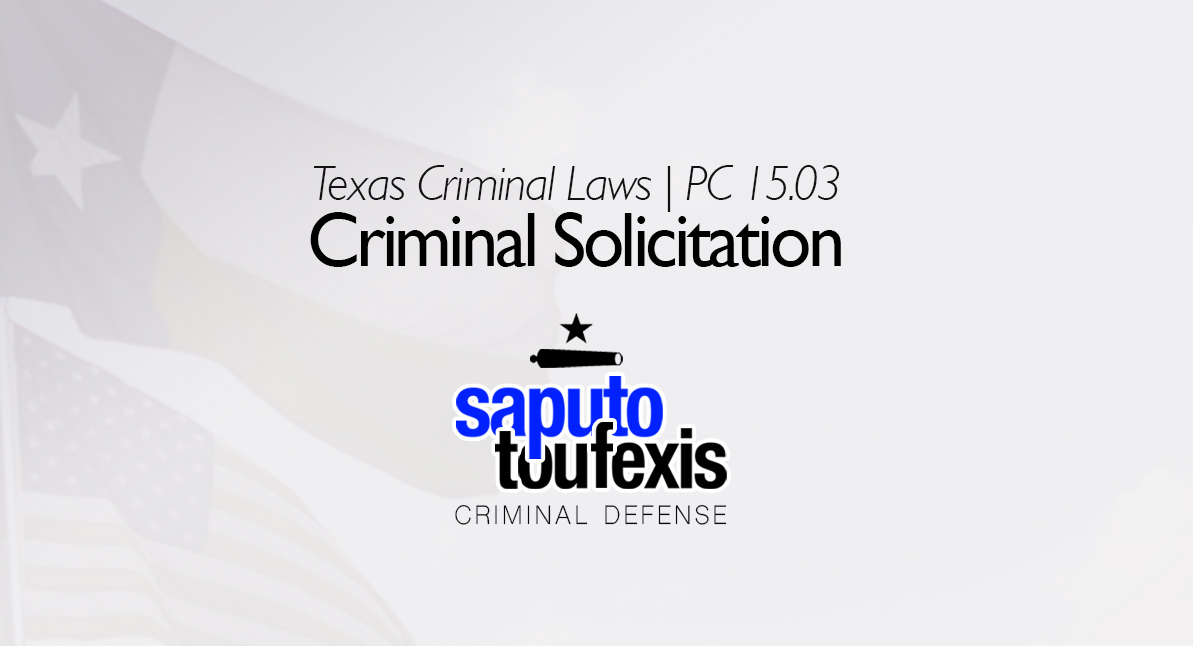The Texas Criminal Solicitation law gives police the right to arrest you if they believe you asked another person to commit a first degree felony offense or a capital felony.
FAQs about the
Criminal Solicitation law in Texas
- What is the current Texas law about Criminal Solicitation?
- How can I be charged with a Criminal Solicitation offense in Texas?
- What is the statute of limitation for Criminal Solicitation in Texas?
- What is the penalty for a Texas Criminal Solicitation offense?
- Can you get probation for Criminal Solicitation in Texas?
- Do I have to register as a sex offender in Texas if guilty of Criminal Solicitation?
- What level of crime is Criminal Solicitation in Texas?
Prosecutors often charge Criminal Solicitation offenses when they believe someone tried to engage in a murder for hire by asking a “hit man” to commit murder. However, the law actually covers many different types of solicitation. The law prohibits soliciting people to commit any first degree felony.
Have you been charged with Criminal Solicitation? Book a consultation to discuss legal representation with attorneys Paul Saputo and Nicholas Toufexis today.
The Texas legislature codified this criminal offense in Texas Penal Code Section 15.03. The law was not updated in 2023. In fact, this law has not been amended since 1993.
The Penal Code classifies the Texas Criminal Solicitation law under Title 4 “Inchoate Offenses,” Chapter 15 “Preparatory Offenses.” Learn more about the Texas offense of Criminal Solicitation below.
What is the current Texas law about Criminal Solicitation?
Texas law currently defines the offense of Criminal Solicitation in Penal Code Section §15.03 as follows:[1]
(a) A person commits an offense if, with intent that a capital felony or felony of the first degree be committed, he requests, commands, or attempts to induce another to engage in specific conduct that, under the circumstances surrounding his conduct as the actor believes them to be, would constitute the felony or make the other a party to its commission.
How can I be charged with a Criminal Solicitation offense in Texas?
You can be charged with Criminal Solicitation in Texas if the state’s attorneys believe that each of the elements of 15.03(a) as described in the section above have been met.
In addition, the Texas Criminal Solicitation law specifies that it is no defense that (1) the person solicited is not criminally responsible for the felony solicited, (2) the person solicited has been acquitted, has not been prosecuted or convicted, has been convicted of a different offense or of a different type or class of offense, or is immune from prosecution, (3) “the actor belongs to a class of persons that by definition of the felony solicited is legally incapable of committing the offense in an individual capacity,” or (4) the felony solicited was actually committed.[2]
However, the Criminal Solicitation statute expressly states that you may not be convicted “on the uncorroborated testimony of the person allegedly solicited and unless the solicitation is made under circumstances strongly corroborative of both the solicitation itself and the actor’s intent that the other person act on the solicitation.”[3]
What is the statute of limitation for Criminal Solicitation in Texas?
The limitation period for Criminal Solicitation is the same as that of the most serious offense that of the felony solicited.[4]
What is the penalty for a Texas Criminal Solicitation offense?
If the offense solicited was a capital offense, then a conviction for Criminal Solicitation in Texas is punished as a Felony of the First Degree,[5] with a maximum possible fine under Texas state law of up to $10,000 and up to life in prison.
If the offense solicited is a Felony of the First Degree, then a conviction for Criminal Solicitation in Texas is punished as a Felony of the Second Degree,[6] with a maximum possible fine under Texas state law of up to $10,000 and prison time of up to 20 years.
Can you get probation for Criminal Solicitation in Texas?
Both judges and juries may grant community supervision for Criminal Solicitation, except that code prohibits judges from ordering probation on their own if the offense is punishable as a first degree felony (meaning that solicitation of capital felonies, like Solicitation to Commit Capital Murder, are not eligible for probation from judges). Notwithstanding this limitation, the code seems to allow judges to accept deferred adjudication pleas for any Criminal Solicitation offense.[7]
Note, however, that no matter the offense, not even juries may recommend community supervision for any suspended sentence of over 10 years.[8]
Do I have to register as a sex offender in Texas if guilty of Criminal Solicitation?
Any conviction or adjudication, including deferred adjudication, for the solicitation of any Texas offense that would require registration if the offense had been completed, requires registration as a sex offender.[9]
What level of crime is Criminal Solicitation in Texas?
The Texas Penal Code classifies Criminal Solicitation as either a first degree felony or second degree felony, depending on the offense solicited.
Learn more about the penalty range for this offense in the section above.
Legal References:
^1. Texas Penal Code §15.03. This law is current as of 2024.^2. Texas Penal Code §15.03(c)^3. Texas Penal Code §15.03(b)^4. Code of Criminal Procedure 12.03(c)^5. Texas Penal Code §15.03(d)(1)^6. Texas Penal Code §15.03(d)(2)^7. Art. 42A.054(a)(1), Texas Code of Criminal Procedure, prohibits the imposition of community supervision if Criminal Solicitation is punishable as a felony of the first degree. But the Criminal Solicitation offense does not appear at all on the list of offenses in Art. 42A.102(b), Texas Code of Criminal Procedure, that restrict deferred adjudication eligibility.^8. Art. 42A.053(c), Texas Code of Criminal Procedure^9. Code of Criminal Procedure, Article 62.001(5)(G)






